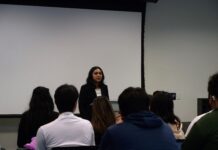
What happens to us after we die? The Immortality Project, a research project which studies this question and offers essay prizes to those who advance the themes of immortality through their work, recently awarded its third $3,000 award to Dr. Jesse Bering for his essay entitled “Life after death: The idea of life after death lives on in near-death experiences and messages from beyond the grave. What’s the evidence?”
Bering’s study, which was published in the Nov. 13, 2013 issue of Aeon Magazine, deals with experimental attempts at finding evidence that Ian Stevenson, a deceased parapsychologist and former head of the Department of Psychiatric Medicine at University of Virginia, “lives on” in a state of afterlife
According to the project’s website, all essays entering into the contest must meet the following criteria listed: being at least 1,000 words in length, published in a popular, non-academic publication with a circulation of at least 10,000, (or a similarly large readership for online venues) and submitted to the project leader by the author of the essay.
Bering’s essay also delved deeply into a detailed discussion about the various initiatives being undertaken by the Immortality Project team, connecting some of the philosophies of the afterlife with a theme of paranormal phenomena, such as near-death experiences and communication with ghosts.
Dr. John Fischer, principal investigator of the Immortality Project and distinguished professor of philosophy at UCR, lauded Bering and his study in a press release. “Bering is at once open-minded and skeptical. He is willing to go to great lengths to discover whether he can communicate with the deceased pioneer of paranormal studies … all the while being frank about his difficulty believing in the possibility of what he has set out to do.”
The Immortality Project, along with advancing research into the components of afterlife and the possibilities of human longevity, also hopes to initiate discussions on those topics in non-academic settings.
Imran Ali, a UCR undergraduate majoring in Arabic, called the idea of achieving immortality on earth “illogical” and “impossible.” He referred to his religious views to argue that there is already a written explanation for what happens after we die.
Fischer explained, “I have great admiration for people who are religious … but we should come to realize … that natural world is capable of incredible things too and the experiences that people have … can point to awe and beauty of the natural world.”
The Immortality Project will be holding a conference open to the public at UCR in June 2014 and will continue to award up to seven publications submitted until June 2015. Following a final conference that will take place in summer 2015, Dr. Fischer will culminate the project by compiling a book that incorporates all award-winning research.








